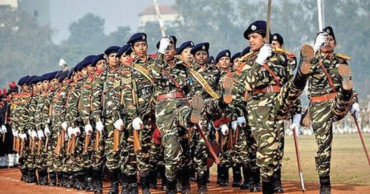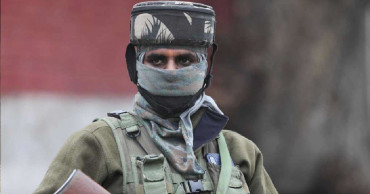India's top court
India's top court orders release of ex-PM Rajiv Gandhi's assassin
India's Supreme Court on Wednesday ordered the release of one of the life convicts in the assassination case of former Prime Minister Rajiv Gandhi.
A two-judge bench of the apex court pronounced the judgment in the wake of a plea seeking the release of AG Perarivalan, who has already served 31 years in jail.
Read: Extradition of PK Halder has to go through legal process: Indian envoy
Gandhi was assassinated on 21st May in 1991 by a suicide bomber of the Liberation Tigers of Tamil Eelam (LTTE) when he was campaigning for the Congress party at Sriperumpudur in Tamil Nadu state.
Gandhi's assassination was seen by many as a retaliation by the LTTE (now defunct) for India's involvement in Sri Lanka's civil war in the late 80s. Gandhi, then Indian PM, deployed peacekeepers there in 1987.
Read: Rohingyas from India coming to Bangladesh: FM
Perarivalan (now 50) was arrested on June 11, 1991. He was subsequently sentenced to life in jail along with few others for aiding Sivarasan, the LTTE man who had hatched the conspiracy to eliminate Gandhi.
3 years ago
India's top court stays sedition law
India's Supreme Court has stayed the country's colonial-era sedition law, in a landmark order that many believe could pave the way for scrapping of the statute.
The 1870 law under Section 124A of Indian Penal Code criminalises any action that "excites or attempts to excite disaffection towards the government". It entails a maximum punishment of life in jail.
Read: India vows to support Sri Lanka's stability
The sedition law "will be paused" and "all pending cases will be kept in abeyance" until the government completes its review, a top court bench said on Wednesday, in the wake of a public interest litigation plea.
"We hope and expect that Centre and state will desist from registering any FIR under Section 124A (sedition law) or initiate proceeding under the same till re-examination is over," said Chief Justice NV Ramana, who led the bench.
"If any fresh cases are filed under the law, the affected parties can approach the court," the top court said.
Read: India remains open to travels by all nationalities
Human rights activists say that the sedition law has been misused by successive Indian governments to silence their critics.
"The law has been misused against people for trivial reasons such as sharing of a social media post or drawing a cartoon critical of the government," said Rajinder Taneja, a Delhi-based activist.
3 years ago
India's top court sets up panel to probe phone-hacking scandal
India's top court Wednesday set up an independent panel to probe allegations that a foreign-origin spyware was used by Prime Minister Narendra Modi's government to snoop on opposition politicians, senior officials, activists and journalists.
The snooping scandal surfaced in 2019 when social media platform WhatsApp's parent firm Facebook filed a lawsuit in a US court, alleging that Israel's NSO Group developed Pegasus software and used it to target prominent Indian citizens during the last general election.
A three-judge bench of the Supreme Court, led by Chief Justice NV Ramana, gave the orderto "probe the falsity and discover (the) truth" in the wake of a number of petitions seeking an investigation into the allegations of phone-hacking by a foreign firm.
"The alleged violation of privacy needed to be examined as it affected the rights and freedom of people. Such technology may also have a 'chilling effect' on press freedom in India," the Chief Justice said, while appointing a retired top court judge to head the panel.
During the hearing of the case, the federal government filed a "limited affidavit", claiming the allegations of phone hacking had no substance. "No government will make public what software it is using to allow terror networks to modulate its systems and escape tracking."
Read: India among world's top 10 for climate tech investment: Report
However, the court came down heavily on the federal government for trying to play the national security card. "The state cannot get a free pass every time national security is raised. In the task of upholding fundamental rights, the state cannot be an adversary."
The judges also said that the government got multiple chances to respond to the court's notices on the allegations. "A vague denial from the government is not sufficient," the court said, giving the panel two months to submit its report in the case.
India's main opposition Congress party welcomed the Supreme Court's order.
"If the PM of the nation colluded with another nation and attacked its own citizens -- which included the Chief Justice, former PMs and other Chief Ministers, leaders of opposition parties, then this is an attack on the nation," Congress leader Rahul Gandhi said.
"Did the other nation have all this data? That is a very important question. Even if this data was on the Prime Minister's desk, then that too is totally criminal, and we will contest it. The Prime Minister is not above the nation," he added.
4 years ago
India's top court warns against any clampdown on social media Covid appeals
India's top court on Friday warned state governments across the country against any clampdown on citizens taking to social media for help or airing their grievances amid a surge in Covid-19 cases.
A three-judge bench of the Supreme Court said that it would initiate contempt action against state governments and law enforcement authorities if they file a police case or arrest people appealing for help or putting out their SOS messages on social media or elsewhere during the pandemic.
"It is of grave concern to me as a citizen or (a) judge. If citizens communicate their grievances on social media, we do not want a clampdown on information. Let us hear their voices. We will treat this as contempt if any citizen is harassed if they want bed or oxygen. We are in (a) human crisis," said Justice DY Chandrachud, who led the bench.
"Even doctors and healthcare workers are not getting beds," he said, describing the situation in the country "grim".
The court's warning came in the wake of a deluge of SOS messages on social media amid an escalating oxygen crisis in India, particularly in the national capital. Hospitals after hospitals in Delhi and its suburbs are sending out SOS messages to health authorities daily, seeking adequate supply of the life-saving gas.
Last week, at least 50 Covid patients on life support died at two leading Delhi hospitals due to oxygen shortage. Jaipur Golden Hospital, a dedicated Covid medical facility in Delhi, said on Saturday morning that 25 Covid patients died around midnight on Friday due to "low-supply oxygen" to critical patients on ventilator.
On Friday morning too, another leading hospital in Delhi announced the deaths of 25 patients in 24 hours due to a shortage of oxygen.In a statement, Sir Ganga Ram Hospital had said, "25 sickest patients have died in the last 24 hours. Oxygen will last another two hours. Major crisis likely. Lives of another 60 sickest patients at risk, need urgent intervention."
It may also be mentioned here that 24 Covid patients on ventilator at a government hospital in the western Indian state of Maharashtra died on Wednesday after their oxygen supply ran out following leakage of the life-supporting gas from a tanker.
The tanker was brought to Zakir Hussain Municipal Hospital in the state's Nashik district to replenish the oxygen cylinders at the medical facility for continuous supply to the 150-plus Covid-19 patients on life support.
4 years ago
India's top court stays arrest of Congress MP Shashi Tharoor
India's Supreme Court Tuesday prohibited police from arresting opposition Congress MP and former UN diplomat Shashi Tharoor as well as six journalists booked on charges of sedition and criminal conspiracy over the January 26 rampage by farmers during their tractor rally in Delhi.
5 years ago
India's top court grants equal rights to women in army
India's top court on Monday ordered the federal government to grant permanent commission and command positions to female officers in the army on par with men, asserting that the government's arguments against the policy were based on gender stereotypes.
6 years ago
India's top court orders review of all curbs in Kashmir
India's top court on Friday ordered the government to review all restrictions, including suspension of internet service, in Indian-controlled Kashmir within a week as an indefinite suspension of people's rights amounted to abuse of power.
6 years ago


.jpg)
.jpg)
.jpg)




